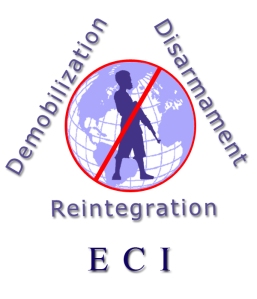Welcome to ECI-DDR ‘s blog.
this web site is under construction.
See you as soon!
Filed under: Uncategorized | 1 Comment »
Filed under: Uncategorized | 1 Comment »
Our Webmaster Thinh and the team of the civil Security save the last survivor in Haiti, in January, 2010.
Filed under: ECI | Tagged: Haïti, hearthquake | Comments Off on Earthquake in Haiti: our Webmaster in action
Within the context of a peacekeeping mission, the Department of Peacekeeping Operations (DPKO) traditionally takes the lead on planning DDR with the collaboration and support of other UN agencies, funds and programmes that are involved, in a DDR process. As we increasingly move towards integrated UN DDR structures and programming, the tendency is for a more participatory planning process involving UN agencies at both country and HQ levels.
Rather, the criteria should be based on tests to determine an individual’s membership of an armed force or group. All those who are found to be members of an armed force or group, whether they were involved in active combat or in support roles (such as cooks, porters, messengers, administrators, sex slaves and ‘war wives’), shall be considered part of the armed force or group and therefore shall be included in the DDR programme.
source: http://www.unddr.org
Filed under: Uncategorized | Leave a comment »
Disarmament is the collection, documentation, control and disposal of small arms, ammunition, explosives and light and heavy weapons of combatants and often also of the civilian population. Disarmament also includes the development of responsible arms management programmes.
Demobilization is the formal and controlled discharge of active combatants from armed forces or other armed groups. The first stage of demobilization may extend from the processing of individual combatants in temporary centres to the massing of troops in camps designated for this purpose (cantonment sites, encampments, assembly areas or barracks). The second stage of demobilization encompasses the support package provided to the demobilized, which is called reinsertion.
Reinsertion is the assistance offered to ex-combatants during demobilization but prior to the longer-term process of reintegration. Reinsertion is a form of transitional assistance to help cover the basic needs of ex-combatants and their families and can include transitional safety allowances, food, clothes, shelter, medical services, short-term education, training, employment and tools. While reintegration is a long-term, continuous social and economic process of development, reinsertion is a short-term material and/or financial assistance to meet immediate needs, and can last up to one year.
Reintegration is the process by which ex-combatants acquire civilian status and gain sustainable employment and income. Reintegration is essentially a social and economic process with an open time-frame, primarily taking place in communities at the local level. It is part of the general development of a country and a national responsibility, and often necessitates long-term external assistance.
source: http://www.unddr.org
Filed under: Uncategorized | Leave a comment »
The objective of the DDR process is to contribute to security and stability in post-conflict environments so that recovery and development can begin. The DDR of ex-combatants is a complex process, with political, military, security, humanitarian and socio-economic dimensions. It aims to deal with the post-conflict security problem that arises when ex-combatants are left without livelihoods or support networks, other than their former comrades, during the vital transition period from conflict to peace and development. Through a process of removing weapons from the hands of combatants, taking the combatants out of military structures and helping them to integrate socially and economically into society, DDR seeks to support ex-combatants so that they can become active participants in the peace process.
In this regard, DDR lays the groundwork for safeguarding and sustaining the communities in which these individuals can live as law-abiding citizens, while building national capacity for long-term peace, security and development. It is important to note that DDR alone cannot resolve conflict or prevent violence; it can, however, help establish a secure environment so that other elements of a recovery and peace-building strategy can proceed.
source: http://www.unddr.org

Filed under: Uncategorized | Leave a comment »